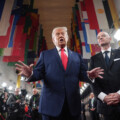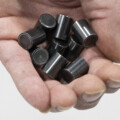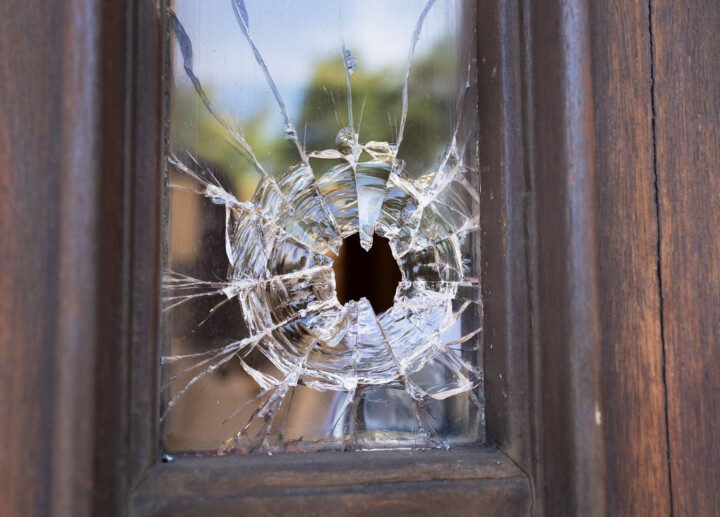In the wake of Mark Carney’s recent trip to Kyiv, where he celebrated Ukraine’s Independence Day and floated the idea of Canadian troops deploying to enforce a future ceasefire, a familiar and comforting narrative has reemerged in our national discourse. It’s the story of Canada as the indispensable middle power, the honest broker, the nation of peacekeepers—a return to the Pearsonian glory days. It’s also a fantasy.
The proposal may be well-intentioned, but it’s still a case study in the chasm between Canada’s political aspirations and its underwhelming military capacity. Canada currently has a mere 59 peacekeepers deployed globally. Our most significant international military commitment is the roughly 2,000 troops stationed in Latvia as part of a NATO battlegroup. News stories have recounted how these same servicemen and women are using their own money to buy combat helmets capable of stopping an enemy bullet. It’s an alarming yet rather poignant symbol of a military hollowed out by decades of neglect.
The uncomfortable truth is that successive governments, Conservative and Liberal alike, have chosen butter over guns for a generation. They’ve done so, in no small part, because it was politically popular. Canadian voters overwhelmingly wanted tax credits and social welfare programs instead of drones and infantry. Those collective choices have now caught up to us just as the world is becoming a more dangerous place.
Nostalgic appeals to peacekeeping and soft power notwithstanding, Canada finds itself excluded from global alliances and missing from key meetings like last week’s gathering of Ukrainian allies at the White House. Hard power, in short, still matters.
Prime Minister Carney’s comments, in this sense, are less a serious policy proposal and more a form of smart politics—a play on Canada’s equivalent of “mystic chords of memory.” It may be an effective appeal to a bygone era, but it’s ultimately perfunctory. Any military contribution to a post-war peace will necessarily be insignificant compared to those of the United States and the major European militaries.
Now, to his credit, Carney has pledged billions of dollars in new spending to rebuild Canada’s military capacity. These major investments should, over time, add assets, soldiers, and technologies to the Canadian Armed Forces.
Yet more funding and even more military assets are a necessary yet insufficient condition to ultimately bolster our defence. There’s a deeper problem inside the Department of National Defence itself, and it extends beyond the well-documented problems with military procurement.
The unspoken truth in Ottawa is that successive governments have had a profound lack of confidence in the department. This isn’t about the country’s brave service members. It’s about the bloated bureaucracy in Ottawa. The department is widely seen as top-heavy, overburdened with administration, and scarred by a string of devastating sexual misconduct scandals.
Put bluntly: There’s a fundamental brokenness within the institution that makes politicians reluctant to pour billions of dollars into it, fearing those dollars will be swallowed by bureaucracy rather than translated into combat-ready capability.
Before any prime minister can make serious commitments on the world stage, he must first prove he understands the depth of these domestic failures. A good start would be to finally heed the advice that has been ignored for nearly 15 years. Former lieutenant‑general and Liberal MP Andrew Leslie once produced a seminal report that diagnosed the disease within the defence establishment: the problem was not just funding, but a dysfunctional organization and structure.
His recommendations were shelved, and the problems have only festered. Appointing someone of Leslie’s calibre to finally tackle this rot would be a powerful signal that the government is serious about rebuilding from the foundation up.
Canadians aren’t averse to paying for a robust national defence. Many of us would willingly support higher taxes if we were confident the investment would be spent effectively to rebuild our military capacity. But we’re tired of the hollow chest-thumping that’s really a substitute for action and a symbolic gesture that masks our decline. We’re tired of prime ministers using the language of a G7 power when our defence capabilities are nowhere near that standard.
The era of Pearsonian peacekeeping is over. The world has changed, and Canada’s capacity has diminished. The first step toward rebuilding is to stop the fantasy, end the hyperbole, and have an honest conversation about the long road ahead. We must fix the Department of National Defence, reform procurement, and spend wisely. Only then can Canada hope to earn back the right to make promises it can actually keep.
This commentary draws on a Hub podcast. It was edited using AI. Full program here.









